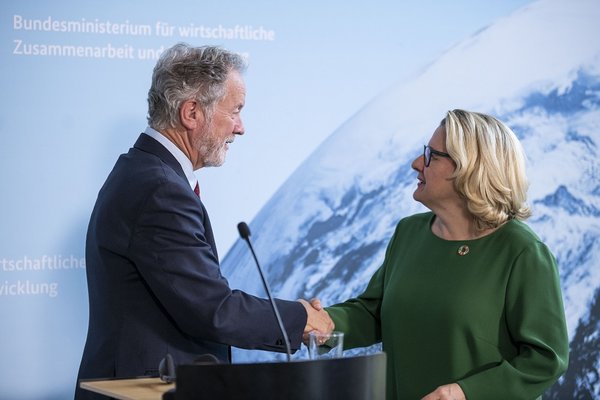 Read this article in French
Read this article in French- Share this article
- Subscribe to our newsletter
German Federal Government increases support for the World Food Programme
Federal Ministry for Economic Cooperation and Development (BMZ) will support the UN WFP with EUR 530 million this year – more than ever before. The investment is intended to create structures leading to greater food security and reducing dependence on imports, for example by increasing local food cultivation, climate-adapted varieties and more efficient fertilisation and irrigation techniques.
According to Minister for Economic Cooperation and Development Svenja Schulze, climate change, the pandemic and a Russian president who uses grain as a weapon are a dangerous blend driving millions of people worldwide into hunger. There are further drivers of the crisis, she said - fertiliser is becoming more expensive and scarce, with fatal consequences for the coming harvests.
Minister Schulze also noted the growing debt burden, which means that many developing countries can no longer pay for their imports. “Particularly at this time, we must not weaken in our support. The answer must be a policy which strengthens developing countries as producers again and reduces dependence on imports. This is why we are working at the local level to establish sustainable, climate-adapted and efficient agricultural and food systems” said Federal Development Minister Schulze in Berlin.
“Germany’s commitment goes far beyond its generous contributions to WFP programmes,” WFP Executive Director David Beasley emphasised at the signature of the agreement in Berlin, adding that German presidency of the G7 has put the issue of food security at the top of the political agenda. Director Beasley warned that we have not reached the climax of this historic hunger crisis. This is why the international community must not only save human lives but also invest even more in sustainable solutions to arm people against future crises, he continued. “If we take the right approach to the war on hunger, we will protect the climate, strengthen women and create stability as a basis for peace,” Beasley said in Berlin.
Germany is the second largest donor to WFP
Germany is the second largest donor to WFP. Currently, in the 82 countries where WFP is active there are 345 million people acutely threatened by hunger. This is almost 200 million more than at the start of 2020. The reasons for this enormous increase are not only the growing number of armed conflicts, climate change and the economic impacts of the pandemic, but also the Russian war of aggression on Ukraine, which has significantly worsened an already tense situation by driving up global costs of food and fertiliser, energy and transport.
The funds now provided by BMZ will be used by WFP where the need is greatest. The focus will be on programmes in Africa and the Middle East.
Combating the causes of food insecurity
In the fight against food insecurity, BMZ is focusing on WFP projects which attack not only the symptoms but also the causes of problems, and make societies more resistant to crisis This includes “food for asset programmes”, where people gain a livelihood by collaborating on creating community infrastructure relevant to food and income. This may take the form of building wells, irrigation canals or storage facilities, flood protection, making agricultural land fertile or reafforestation. Further activities are school meal programmes or promoting small farmers through training, improving market access or avoiding harvest losses. BMZ is also promoting the expansion of social protection systems by WFP.
BMZ funding for WFP comes largely from special funds of EUR 880 million committed by the German federal government under the Global Alliance for Food Security initiated by Development Minister Schulze.
(BMZ/wi)
More information:
Berlin Ministerial Conference – Uniting for Global Food Security – June 2022





Add a comment
Be the First to Comment